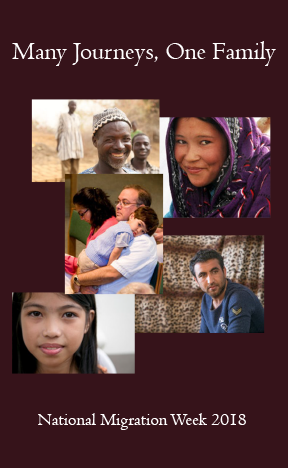My dear brothers and sisters in the Lord,
 Each year for over 50 years now, the Roman Pontiffs have designated January 1st as the World Day of Peace. Their intention is that our prayer for peace at the beginning of the New Year will bring fruits to the year just begun.
Each year for over 50 years now, the Roman Pontiffs have designated January 1st as the World Day of Peace. Their intention is that our prayer for peace at the beginning of the New Year will bring fruits to the year just begun.
This year, our Holy Father, Pope Francis, has chosen the theme Migrants and Refugees: Seekers of Peace. He has taken a special role in our world for the protection of migrants, and especially refugees. In the first weeks of his Pontificate, Pope Francis traveled to the island of Lampedusa, which was the scene of the arrival of many refugees leaving northern Africa. Unfortunately, some were washed up on the shores of this small Italian island close to northern Africa. The hallmark of the Pontificate of Pope Francis has been to speak out on behalf of the defenseless. He poses this question: “Why so many refugees and migrants?” in the world today.
Unfortunately, our world today is not a world of peace. The lack of peace produces refugees and migrants, many fleeing for their lives and others fleeing for better economic conditions. All, however, are compelled by forces around them. They make rational decisions to migrate, but these are decisions forced upon them by circumstances beyond their control.
In our world today, we recognize that there are 250 million international migrants, 22 million of whom are considered refugees. This is a significant population of people who need to be seen as our brothers and sisters, recognizing them as beneficiaries, as we are, of the common goods of this world as Pope Paul IV once said.
The Holy Father proposes “Four cornerstones for our action.”
First, refugees need to be welcome with legal pathways of entry and should make free decisions, not being forced by circumstances beyond their control. The hospitality and welcome told to us in the Gospel of Matthew and in the Letter to the Ephesians reminds us that we may have shown hospitality to angels without knowing it.
Second, we must protect migrants from the dangers that surround them and offer asylum when it is truly necessary.
Third, we must promote the integral human development of migrants and refugees. This means that once they arrive in a receiving country, they must be offered the opportunity to work and become productive citizens of the country that will accept them.
Finally, these migrants and refugees should be integrated into society and be given full participation so that they can develop their God-given talents for the benefits of their new country.
The Holy See is participating during this Year 2018 in two global compacts proposed by the UN for developing an orderly migration policy among nations, as well as assisting and updating the refugee agreement among nations that has been in effect for more than the past 70 years.
Our Holy Father was inspired by the words of Saint John Paul II who said, “If the ‘dream’ of a peaceful world is shared by all, if the refugees’ and migrants’ contribution is properly evaluated, then humanity can become more and more of a universal family and our earth a true ‘common home.’”
Pope Francis goes on to say, “Throughout history, many have believed in this ‘dream,’ and their achievements are testament to the fact that it is not merely a utopia.”
The world is far from a place where people live in a dreamland without difficulty.
Recently, I was heard on the radio supporting action to legalize the Dreamers, undocumented immigrants who were children when their parents brought them to our country illegally, through no fault of their own. I stated that these Dreamers should not be forced to leave America, the only home they have ever known.
Some have criticized these announcements as a “misuse of diocesan money” or as “political announcements.” In fact, money for the airtime was donated and the statements were moral in nature. Many times, public policy has moral content and implications that the Church must bring to people’s attention. This certainly was my intention.
The week beginning Jan. 7 is always National Migration Week as declared by the U.S. Conference of Catholic Bishops. This year’s theme is “Many Journeys, One Family,” which tries to capture the various migrant movements, between and within countries, which migrants undertake to find a safe haven. Whatever movements happen, they are movements for a better life situation. During this National Migration Week, we are asked to pray for our migrants as if they were members of our own family, the common human family to which we all belong.
As we put out into the deep of the New Year 2018, I am certain that the issues of migration will be at the top of our concern both in the news of international events and in our own country. We must not forget the words of our Holy Father, Pope Francis, when he tells us that migrants and refugees are seekers of peace. They can help us to bring peace to a troubled world. We understand the facts that surround their movement and welcome them as brothers and sisters to our common home.
